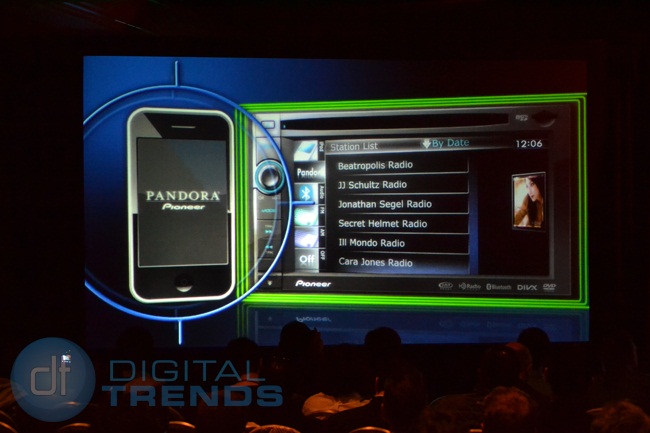
Pioneer makes a wide array of consumer electronics products, but you wouldn’t know it from its CES press conference today. The company focused exclusively on its car stereo and accessories, putting its car division’s director of marketing, Ted Cardenas, on the stand to make some minor announcements including additional social networking support, the launch of a new iPhone dock, and its own app platform.
Pandora, Twitter, Facebook

Cardenas announced that nine Pioneer car stereo models will now support Pandora Internet radio, up from two last year and the electronics manufacturer is partnering with Aha Radio to add Twitter, Facebook, and podcast support to a couple of its high-end audio dashboards. Aha Radio, originally an iPhone app, reads tweets and Facebook messages out loud via a robotic-sounding voice and has about 100 podcast series available for download. It also features some light location searching, will read local Yelp reviews, and has traffic reports.
SmartCradle

In addition to adding Aha, Pioneer is also launching an iPhone car dock called the SmartCradle. It’s designed to enhance GPS performance by feeding data back into your iPhone from its own internal GPS sensor, gyroscope, and accelerometer. It has a built-in volume control, speaker, and microphone as well as automatic sound leveling, which adjusts volume based on the amount of noise in the vehicle. If you’re driving on the highway, for example, the device will compensate.
PAIS

Finally, Pioneer is joining a flurry of manufacturers and launching its own App platform. Dubbed PAIS, or Platform for Aggregation of Internet Services, the platform will attempt to sync up the smartphone, TV, and car experiences to ensure that no tweet or Facebook post goes unread on your trip from the living room to the car. The company also plans to add social features, like the ability to send your friends directions from your dash. Initial apps on the platform include Voicebox, Accuweather, Facebook, Google, Slacker, Tuner2, Twitter, WCities, and Yelp. Service API and reference client code is available now to device makers and app developers.


